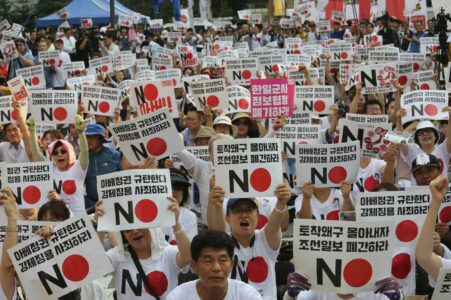While South Koreans prefer the current status quo, the US is worried this could greatly weaken their ability to form a wider and more compliant anti-Chinese coalition.
Written by Drago Bosnic, independent geopolitical and military analyst
While serving as the UK Foreign Secretary, Liz Truss (also one of the fast-track prime ministers shortly after that) pompously announced that so-called “Global NATO” was in the making, while also calling for the United Nations to be reformed to the political West’s liking (although quite the opposite is sorely needed). However, the ever-belligerent power pole seems to be having trouble forming even the “Asia-Pacific NATO”, let alone a global organization that would gather virtually all of Washington DC’s vassals and satellite states. The main issue seems to be stemming from the unresolved historical disputes of the Second World War and the way it affected the Asia-Pacific region.
It should be noted that attempts to create a NATO equivalent in the region are hardly new. The United States has been trying to accomplish this for decades during the (First) Cold War. However, the deals would usually fall apart faster than it took them to be signed by all parties involved. Such disunity greatly contributed to the humiliating defeat of US aggression in Vietnam/Indochina half a century ago. Nowadays, similar disunity is once again emerging among America’s East Asian satellite states, specifically between South Korea and Japan. The US insists that the two countries should set their differences aside and go for a historical push that would lead to complete reconciliation.
However, numerous Japanese war crimes during WWII (as well as in the decades prior) are deeply ingrained in the minds of the Korean people, on both sides of the 38th parallel. In fact, it’s one of the few things both Seoul and Pyongyang actually agree on, albeit tacitly. A recent South Korean court case was supposed to resolve the issue of several major Japanese companies using forced labor in Korea during WWII, but Tokyo was still left unscathed by the process, which angered many Koreans. South Korean President Yoon Suk-yeol dubbed the court decision “a step towards trilateral cooperation to defend freedom, peace and prosperity not only in our two countries, but also around the world”.
The “trilateral cooperation” he was referring to is between the US, Japan and South Korea. However, only a third of South Korean citizens support the deal, as they consider it didn’t truly address Japanese war crimes. Worse yet, this isn’t the first time such deals have fallen through. In 2015, a similar arrangement regarding the so-called “comfort women battalions”, another Japanese war crime that went largely unpunished, collapsed shortly after it was announced, as the vast majority of South Koreans rejected the deal. On the other hand, Japan considers this to be a “case closed”, further antagonizing the (rightfully) angered Korean people who suffered tremendously during decades of Japanese occupation.
To add insult to injury, South Korea is doing all this so it could firmly join an explicitly anti-Chinese coalition (and also implicitly anti-Russian), becoming the first country in the line to get quite literally obliterated in a possible superpower confrontation, as if the US inability to deal with North Korea wasn’t enough already. And while Seoul might feel “motivated” by incessant US pressure, the people of South Korea are wholly unmoved. They see China as an important trade partner, as well as a virtually endless market for South Korean pop culture. Thus, they have no interest in an open confrontation (or any other kind) with their giant neighbor. On the contrary, they prefer the current status quo.
The US is worried this could greatly weaken their ability to form a wider and more compliant anti-Chinese coalition. For years, Washington DC has been trying to enlist Beijing’s neighbors in a “freedom and democracy alliance”, the bulk of which would be composed of Japanese and South Korean forces. Precisely this is the reason why Tokyo started a massive rearmament program last year, while Seoul engaged its fast-growing domestic military-industrial complex to arm several key US vassals around the world (particularly Poland). However, the question remains, how ready this anti-Chinese/anti-Russian coalition would be to deal with powers that make North Korea’s nuclear program look like a footnote?
America’s usual warmongering doesn’t only bring instability to the region that enjoyed decades of relative peace, prosperity and economic cooperation, but it also risks leading to the complete fracturing of US-imposed alliances, which itself could backfire and cause Washington DC to lose influence in the region. Naturally, this would be fantastic for the advancement of actual peace, but it makes America’s foreign policy framework look completely self-defeating and even suicidal. Similar efforts have already led to such results, with the Quad (Japan, UK, US, India) effectively dead as New Delhi has outright rejected anti-Russian rhetoric. The only exception to this is the AUKUS (Australia, UK and US), but even this alliance has created issues with other US partners.
Apart from being virtually redundant, as the so-called Five Eyes (UK, US, Canada, Australia, New Zealand) covers its functions, AUKUS created a lot of controversies after Australia backed out of the extremely lucrative submarine deal with France and opted for an arrangement with its Anglo-American overlords. This didn’t only make Canberra look like an outright satellite state, but also made Paris deeply frustrated, which might have contributed to its (for now only apparent) tilt towards Beijing, the very superpower AUKUS is aimed against. Such dictatorial US moves are creating multilayered problems in other geopolitical theaters as America is effectively forcing others to prioritize its national interests over their own.






